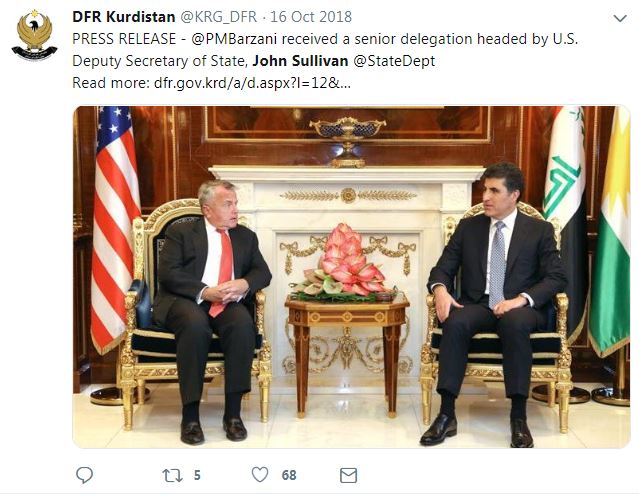The KRG’s new President, Prime Minister need a new Washington Representative
 6/22/2019 4:47:14 PM
6/22/2019 4:47:14 PM
6038 View
Anonymous
+
-
Editorial Note: NRT does not typically publish anonymous Op-Eds, but has done so at the request of the author, who is close to the KRG, in order provide their perspective on a sensitive issue. We believe their position would be in jeopardy should their identity be revealed, which is why we have taken this unusual step.
Times change and so do governments. In the Kurdistan Region, parliamentary elections were held last fall and the parties are in the final stages of forming a new government. All indications are that no existing ministers will serve another term in the same post. Iraq has also held national elections and now has a new parliament, Prime Minister, and cabinet. In Washington, a new Congress has been sworn in with Democrats in control of the House of Representatives and Republicans in the Senate. It is time also to change the Kurdistan Regional Government’s (KRG) Representative in Washington, especially since Bayan Sami Abdul Rahman has failed in her basic mission of furthering Kurdish interests there.
The Kurds are more critical to the international community now than ever before, sitting at a strategic geopolitical crossroads, but ruled by oppressive regimes in Turkey, Iraq, Syria, and Iran. Kurds have the numbers and a worthy cause and, if they play their hand well and intelligently, could emerge as victors from the sand storm that has engulfed the Middle East over the past decade, correct the unjust treaties that have divided them for the last hundred years, and emerge as a true player in the region.
With that said, the Kurds do have one major institution with plenty resources and access to the right governments to ensure that success: the Kurdistan Regional Government. The KRG is well positioned to defend the entire Kurdish nation, particularly in Washington, where the geopolitical decisions affecting the Kurdish nation are most likely be made.
As the senior Kurdish diplomat in the most powerful capital in the world, Ms. Rahman has, however, failed in her core mission. According to her biography, “key to her role [is] strengthening ties between Kurdistan and the United States, advocating her government’s position on a wide array of political, security, humanitarian, economic, and cultural matters and promoting coordination and partnership.” In the four years since her appointment, however, she has yet to accomplish any major initiatives in Washington, all while the Kurds were in the spotlight during the fight against ISIS. To this day, she has not secured a reliable network of interlocutors in the U.S. Government, including within the National Security Council, the State Department, the Pentagon, or the U.S. Congress.
Her predecessor, now Deputy Prime Minister of the KRG, established the right contacts in all branches of the U.S. government and influential thinks tanks. When Islamic State was nearing the suburbs of Erbil, those contacts were critical to securing the aerial support that the Peshmerga needed to fend off those attacks. Such figures included Vice President Joe Biden, then-Deputy National Security Advisor Tony Blinken, then-Deputy Assistant Secretary of State for Iraq and Iran Brett McGurk, and Senator John McCain, among others. Should this scenario repeat itself, the KRG would find itself in a very bad place because of Ms. Rahman’s failure to maintain such a network.
Think tanks in Washington are sometimes as powerful as the decision makers in government with regard to framing strategic issues. They are constantly researching solutions to a variety of challenges facing the U.S. and the world and argue, advocate, and lobby for policy changes at local, state, and federal levels. Ms. Rahman’s predecessor built a trusted network of such experts from a variety of backgrounds and institutions. They relied on him for information and he relied on them for making the case for policies across the spectrum. Ms. Rahman has not developed her own trusted network. Those close to her office inform us that they simply do not trust her, having lied to them on numerous occasions. This is a loss for her people and a failure on her part.
Furthermore, Ms. Rahman has missed some major opportunities to further her people’s case in Washington during the first two years of the Trump Administration. Despite Trump's rhetoric on disengagement from the Middle East, his actions run counter to that stance. Issues such as the reimposition sanctions on and the looming prospect of armed conflict with Iran, declining relations with Turkey, the announcement that U.S. troops would be pulled out of Syria, and the ongoing fight against ISIS all have Kurds at their center and are opportunities to be exploited and managed. Yet Ms. Rahman has failed or neglected to realize and seize such openings, which may never come back. While these topics are still evolving, it would serve Kurdish interests to appoint someone who can harness these fast-moving developments in Washington, while the U.S. is still engaged in the Middle East and the Kurds are a critical player.
This has taken a toll. In the years since 2005, KRG lobbying machine built by her predecessor has always outperformed those of the Iraqi Embassy in Washington. This was highlighted by the New York Times in an article entitled “Iraqi Kurds Build Washington Lobbying Machine to Fund War Against ISIS.” The same could not be said about her. Today, Iraqi Ambassador Dr. Agreed Yaseen outperforms her. An MIT graduate, he is a talented and savvy diplomat who can be seen everywhere in Washington and is trusted by his peers, US officials, and think tank experts.
Credibility in diplomatic and Washington circles is key. Sources close to the U.S. administration tell us that she is too partisan, often makes false claims, and appears misinformed and out-of-date. This has led to U.S. officials bypassing her and directly going to her superiors with messages that could easily be relayed through her office in Washington.
Unfortunately, this is not only true of the U.S. side, since similar methods are applied by her own superiors. KRG officials often visit Washington for off-the-record meetings and messaging without consulting or informing Ms. Rahman. This is another indication that she has lost credibility and her presence is no longer important. She has been sidelined by her own government and the host government in Washington. Take the example of a recent visit by a senior U.S. delegation visiting the Kurdistan Region. When then-KRG Prime Minister Nechirvan Barzani received U.S. Deputy Secretary of State John Sullivan on October 16, 2018, Ms. Rahman was nowhere to be seen, despite the fact that she was on the ground in Kurdistan at the time.

Being unproductive is one thing, but Ms. Rahman has also taken on reckless projects as well. Take the example of the Referendum for Independence in September 2017. Despite repeated warnings by Washington to the KRG leadership not to hold the referendum, Ms. Rahman failed to properly alert her superiors. In fact, she did the opposite. In August of 2016, she teamed up with the Washington Times and the Kurdistan24 media network for a daylong symposium and arranged for a 36-page special propaganda section on Kurdistan making the case for independence to be published.
Even if public relations were her only task, Ms. Rahman would have also fallen short in that regard. During that August symposium, at a time of intense heat and power outages in the Kurdistan Region, she claimed that the Region had a surplus in electricity generation and was, in fact, ready to export electricity. She publicly stated, “we are now able to have electricity for our region and we are also thinking about exporting it to neighboring provinces.” At best, the KRG could provide a mere eight hours of electricity at the time. This misleading statement drew condemnation from across the world and contributed to the sense that she is out of touch and misinformed.
Another telling example of Ms. Rahman’s lack of focus came when U.S. President Donald Trump announced that he planned to withdraw all troops from Syria, a move that sent shockwaves across the world and drew international condemnation from the 79-member Global Coalition to defeat Islamic State. Disapproval of the announcement came also from the U.S. Congress, particularly from his own Republican party. Except for Putin, Erdogan, Assad, and Khamenei, the entire international community vowed that the protection of the Kurds in Syria was a top priority. Judging by the contemporaneous statements of its representation in Washington, the KRG was not among them. Instead, the KRG mission’s public silence was deafening. While the Kurdish fate was being put in the hands of the Turkish government, Ms. Rahman was tweeting about a recent snowstorm in the mountains of Duhok and Erbil. While this is just another example of her lack of focus, it is emblematic of the need for new and serious diplomatic leadership in Washington.

Additionally, she continued to live the lavish lifestyle at during difficult economic times in the Kurdistan Region. Multiple people have spotted Ms. Rahman taking business and first-class flights across the ocean while the Peshmerga forces, teachers, and other public servants had their pay held back by as many as seven months at one point. It makes us wonder: was there really a financial crisis in Kurdistan?
Washington is an 800-pound gorilla that is difficult to manage. It requires having a solid, non-partisan team that is empowered to carry out assignments in a variety of disciplines. Managing this massive animal takes detailed knowledge of its inter-agency operations, including security, domestic and international politics, trade, economy, and, most importantly, the ability to position national interests in concert with those of the U.S. Handling that task requires serious leadership, which is currently absent at the mission. There are any number of qualified candidates who could replace Ms. Rahman, individuals who could reverse the damage that she has done to the KRG’s position in Washington.
While the Kurds have spent the last four years valiantly fighting the world’s most dangerous terrorist organization, the leadership representing Kurdish interests in Washington is not up to the task and unable to perform basic duties. The people of Kurdistan need a more competent Representative to further their interests in Washington. Therefore, it would be wise for the new leadership of the KRG to find a new face to represent them in Washington.
The views and opinions expressed in this article are those of the author and do not necessarily reflect those of NRT.